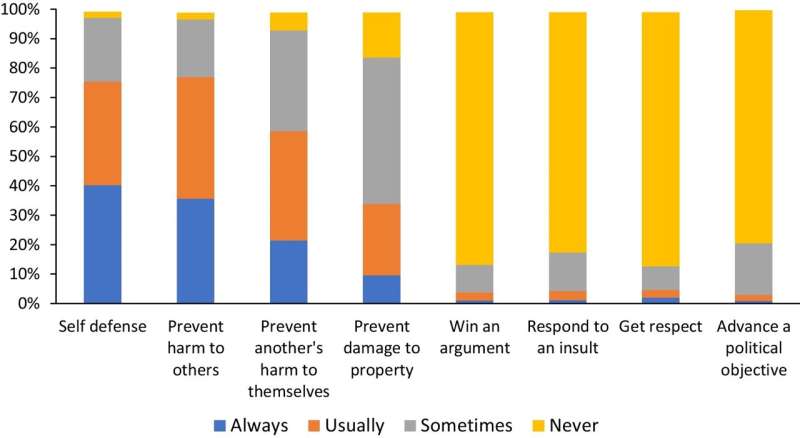This article has been reviewed according to Science X's editorial process and policies. Editors have highlighted the following attributes while ensuring the content's credibility:
fact-checked
peer-reviewed publication
trusted source
proofread
New study looks at attitudes towards political violence

A small segment of the U.S. population considers violence, including lethal violence, to be usually or always justified to advance political objectives. This is according to newly published research from the UC Davis Violence Prevention Research Program (VPRP).
The study provides a complex portrait of the attitudes and concerns about the state of democracy in the U.S. It also highlights the underlying beliefs that may inform the potential for violence.
The study was published Sept. 29, 2023, in Injury Epidemiology.
"This study was motivated by the possibility of violence that could put at risk the future of the United States as a free and democratic society," said Garen Wintemute, first author of the study. Wintemute is an emergency department physician and director of VPRP and the California Firearm Violence Research Center.
A belief in fringe theories and a threatened democracy
The researchers conducted the nationwide online survey from May 13 to June 2, 2022. The survey was conducted in English and Spanish. A total of 8,620 adult members of the Ipsos Knowledge Panel were included in the analysis. The sample was designed to represent the general adult population of the U.S.
The results show a mixture of concern for the state of the country and support for violence to advance political objectives.
Almost 90% of the participants (88.9%) felt it was extremely or very important for the U.S. to remain a democracy. A little more than two-thirds (67.2%) perceived that there is a serious threat to U.S. democracy.
When asked if "American democracy only serves the interest of the wealthy and powerful," 36% of the participants agreed strongly or very strongly.
A large percentage of the survey participants—81.7%—said they felt the country was generally headed in the wrong direction.
Three survey questions gave insights into the number of people who believe in conspiracy theories, such as those promoted by QAnon.
Nearly 1 in 10 respondents (9.1%) agreed strongly or very strongly that U.S. institutions are "controlled by a group of Satan-worshipping pedophiles who run a global child sex trafficking operation."
One in 10 (10%) also agreed strongly or very strongly that "a storm coming soon" will "sweep away the elites in power and restore the rightful leaders." And almost 1 in 5 (19.3%) agreed strongly or very strongly that "we are living in what the Bible calls 'the end times.'"
Survey assessed willingness to engage in violence
The survey also gauged the participants' willingness to engage in violence, including political violence, under specific conditions. The respondents were asked, "What do you think about the use of force or violence in the following situations?" with response options being always, usually, sometimes, or never justified. "Force or violence" was defined as "physical force strong enough that it could cause pain or injury to a person."
The respondents' views varied substantially with the proposed circumstances. Large majorities of respondents saw violence as usually or always justified in self-defense (76.1%) or to prevent assaultive injury to others (77.9%).
In contrast, large majorities felt that violence was never justified to win an argument (85.7%), respond to an insult (81.5%), or get respect (86.2%). Only 3% considered political violence in general to be usually or always justified.
The researchers found that the support for political violence and the use of firearms in such violence declined with increasing age, education and income.
Some responses reflect groups of concern. Several of the key findings:
- 32.8% considered violence to be usually or always justified to advance at least one of 17 specific political objectives, such as preventing discrimination based on race or ethnicity, stopping an election from being stolen, or stopping voter fraud or intimidation.
- 18.9% agreed strongly or very strongly that "having a strong leader for America is more important than having a democracy."
- 16.2% agreed strongly or very strongly that "in America, native-born white people are being replaced by immigrants."
- 13.7% agreed strongly or very strongly that "in the next few years, there will be civil war in the United States."
- 7.7% thought it very or extremely likely that within the next few years, in a situation where they believe political violence is justified, "I will be armed with a gun."
- 1.1% thought it very or extremely likely when political violence is justified that "I will shoot someone with a gun."
The overall results show that a small but concerning segment of the population considers violence, including lethal violence, to be usually or always justified to advance political objectives. The authors emphasized that violence prevention efforts should proceed urgently based on the best evidence available.
Large majority rejected political violence
The researchers noted that a large majority of respondents rejected political violence altogether. Most respondents who endorsed political violence were unwilling to resort to violence themselves. The researchers said the challenge now for those majorities is to recognize the threat posed by those who are willing to engage in political violence and respond appropriately.
"Political violence has not traditionally been included in the purview of public health. This is an oversight in our opinion, and we hope this work helps to reframe the matter," said Veronica Pear, senior author of the study. Pear is a social epidemiologist and assistant professor in the Department of Emergency Medicine at UC Davis Health.
Future papers from VPRP will explore beliefs that might fuel violence from the political left.
Study co-authors include Sonia L. Robinson, Andrew J. Crawford, Daniel J. Tancredi, Julia P. Schleimer, Elizabeth A. Tomsich, Paul M. Reeping and Aaron B. Shev.
More information: Garen J. Wintemute et al, Views of democracy and society and support for political violence in the USA: findings from a nationally representative survey, Injury Epidemiology (2023). DOI: 10.1186/s40621-023-00456-3
Journal information: Epidemiology
Provided by UC Davis





















